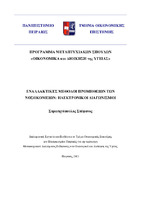Εναλλακτικές μέθοδοι προμηθειών των νοσοκομείων: ηλεκτρονικοί διαγωνισμοί
Alternative hospital supplying methods: Electronic Public Procurements

Προβολή/
Λέξεις κλειδιά
Δημόσιοι ηλεκτρονικοί διαγωνισμοί προμηθειών ; Δημόσιες συμβάσεις προμηθειών ; Προμήθειες νοσοκομείων ; Διαύγεια ; Παρατηρητήριο ΤιμώνΠερίληψη
Τα τελευταία χρόνια, η παραγωγικότητα και η οικονομική αποδοτικότητα στον τομέα της ιατροφαρμακευτικής περίθαλψης σε όλες τις αναπτυγμένες χώρες αναμφισβήτητα αποτελεί μία αμφιλεγόμενη κατάσταση, λόγω του ύψους των οικονομικών πόρων που αφομοιώνονται από έναν τέτοιο τομέα. Η οικονομική θεωρία βελτιστοποίησης, δηλαδή η μεγιστοποίηση της ικανοποίησης του καταναλωτή με το μικρότερο δυνατό κόστος, λόγω περιορισμένων οικονομικών πόρων, αποτελεί πάντα τον απώτερο στόχο και το θεμιτό αποτέλεσμα κάθε κοινωνίας σχετικά με την διαχείριση του συστήματος περίθαλψης υγείας.
Ο νοσοκομειακός τομέας, από την άποψη των δαπανών που γίνονται τόσο διεθνώς όσο και στην Ελλάδα, έχει μεγάλη αύξηση τα τελευταία 35 χρόνια και σήμερα στην Ελλάδα οι δαπάνες της φροντίδας υγείας απορροφούν μέχρι και το 50% του συνολικού ΑΕΠ (Ακαθάριστο Εγχώριο Προϊόν) της χώρας. Σε ένα τέτοιο συνεχώς εξελισσόμενο περιβάλλον, και σύμφωνα με ερωτηματολόγια και έρευνες που έχουν διεξαχθεί στην Ελλάδα ανά τα χρόνια, παρότι στον κλάδο της υγείας επενδύονται υπέρογκα κεφάλαια, στους ασθενείς υπάρχει η αίσθηση ότι οι ανάγκες υγείας δεν αντιμετωπίζονται επαρκώς εξαιτίας της έλλειψης των πόρων στον τομέα της υγείας. Έτσι, καθίσταται επιτακτική η ανάγκη για αποτελεσματικότερη αξιοποίησή των διαθεσίμων πόρων και αποδοτικότερη απόκτηση αναλωσίμων υλικών.
Το ζήτημα των προμηθειών των νοσοκομείων αποτελεί ένα από τα βασικά σημεία, στα οποία μειονεκτεί το ΕΣΥ (Εθνικό Σύστημα Υγείας) στην Ελλάδα. Τα προβλήματα εστιάζονται σε καίριες πτυχές της διαδικασίας των προμηθειών ενός δημόσιου φορέα, όπως καθυστερήσεις στην προμήθεια των υλικών, περιθώρια για καταστρατηγήσεις τόσο στις τιμές όσο και στην ποιότητα των πάσης φύσεως υλικών εξαιτίας της έλλειψης κοινών βασικών προδιαγραφών και λόγω περεταίρω καθυστερήσεων στην εξόφληση των προμηθευτών. Το αποτέλεσμα είναι να επιβαρύνονται οι τιμές αγοράς και να ενθαρρύνονται ολιγοπωλιακές καταστάσεις εξαιτίας της διεξαγωγής διαπραγματεύσεων ξεχωριστά από το κάθε νοσοκομείο. Επομένως, καθίσταται αναγκαίο να τονιστεί ότι οι διαδικασίες αξιολόγησης και επιλογής των κατάλληλων προμηθευτών υγείας αποτελούν ζωτικής σημασίας ενέργειες, στις οποίες το κάθε νοσοκομείο πρέπει να δώσει μεγάλη έμφαση και προσοχή.
Σύμφωνα με την οικονομική θεωρία, οι διαθέσιμοι πόροι −και επομένως οι πόροι στον τομέα της ιατροφαρμακευτικής περίθαλψης − είναι ανεπαρκείς συγκριτικά με τις υπάρχουσες ανθρώπινες ανάγκες. Πάραυτα, ο τομέας της υγείας εμφανίζει υψηλή ανταγωνιστικότητα σε ότι αφορά στην διάθεση πόρων συγκριτικά με άλλους τομείς της ανθρώπινης δραστηριότητας (όπως παιδεία, εθνική άμυνα, κοινωνική ασφάλιση κ.ά.) καθώς νοσοκομεία και μονάδες ιατροφαρμακευτικής περίθαλψης έχουν συνεχώς τον στόχο και προσπαθούν να βρουν τρόπους διαχείρισης, περιορισμού του κόστους και βελτιστοποίησης της απόδοσης τους. Επομένως, θα πρέπει να διερευνηθεί ποια είναι η αποδοτικότερη κατανομή των δημόσιων πόρων, ώστε να μεγιστοποιηθεί η ωφέλεια του κοινωνικού συνόλου. Ωστόσο, κάτι τέτοιο πρέπει να γίνει λαμβάνοντας υπόψιν την ύπαρξη μεγάλων οργανωτικών και διοικητικών ελλείψεων στα συστήματα υγείας, οι οποίες φυσικά οδηγούν σε μείωση των παραγόμενων προϊόντων και υπηρεσιών. Επιπρόσθετα κάποια κριτήρια τα οποία πρέπει να λαμβάνονται υπόψιν είναι η σχέση που υπάρχει μεταξύ των αναμενόμενων θετικών αποτελεσμάτων στην υγεία του ευρύτερου πληθυσμού καθώς και η αποδοτικότητα της απώλειας διαθεσίμων πόρων που γίνεται στο όνομα της υγείας.
Αναμφίβολα, η παραγωγή και παροχή υπηρεσιών περίθαλψης υγείας δημιουργεί το μεγαλύτερο μέρος του κόστους για τον τομέα της φροντίδας υγείας, καταναλώνοντας τεράστιους υλικούς και ανθρώπινους πόρους. Επιπλέον, η αυξημένη ζήτηση των υπηρεσιών φροντίδας υγείας, λόγω της αυξανόμενης γήρανσης του πληθυσμού, του νέου νοσολογικού προτύπου και της εισόδου νέων τεχνολογιών στον τομέα της υγείας, προκαλεί αύξηση στα λειτουργικά κόστη των νοσοκομείων. Ένας ζωτικός παράγοντας που επηρεάζει τη διαμόρφωση του λειτουργικού κόστους στα νοσοκομεία είναι ο τρόπος διαχείρισης και απόκτησης αναλωσίμων υλικών.
Στο σημείο αυτό, επιβάλλεται να αναφερθεί η συμβολή και σημασία των εργαζόμενων στα ελληνικά νοσοκομεία, καθώς επηρεάζουν άμεσα την αλυσίδα των προμηθειών και κατ’ επέκταση το λειτουργικό κόστος των νοσοκομείων. Το μέγεθος, η σύνθεση και η ποιότητα του ανθρώπινου δυναμικού προσδιορίζουν σε μεγάλο βαθμό την αποδοτική και αποτελεσματική απόκτηση και διαχείριση των υλικών. Επομένως, είναι σημαντικές οι πληροφορίες που μπορούν να αντληθούν σχετικά με την απόκτηση αναλωσίμων υλικών στα νοσοκομεία − και αυτός είναι ο σκοπός της εν λόγω εργασίας – στόχος της εργασίας είναι η αποτύπωση των μεθόδων που ακολουθούνται από τους εργαζόμενους όσον αφορά στην διεξαγωγή και την διαχείριση των ανοικτών δημόσιων διαγωνισμών προμηθειών στο πλαίσιο της απόκτησης αναλωσίμων υλικών. Επιπρόσθετα, για την ευρύτερη κατανόηση της διαδικασίας απόκτησης προμηθειών θα γίνει διεξοδική ανάλυση των νομοθεσιών οι οποίες περιγράφουν τις διαδικασίες που ακολουθούνται από τους εργαζόμενους αναφορικά με την αξιολόγηση προϊόντων καθώς επίσης στο πλαίσιο αυτό θα γίνει προσπάθεια για την εύρεση και διερεύνηση τρόπων και τεχνικών οι οποίες στοχεύουν στην βελτίωση της ανταγωνιστικότητας της αγοράς και την διασφάλιση της ποιότητας στον τομέα υγείας.

